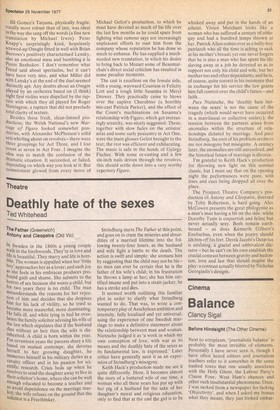Theatre
Deathly hate of the sexes
Ted Whitehead
The Father (Greenwich) Antony and Cleopatra (Old Vic) In Sweden in the 1860s a young couple v■talk in the birchwoods. They're in love and I.ife is beautiful. They marry and life is horrible, The woman is appalled when her 'little b°Y approaches her as a lover; and such joy as she feels in his embraces produces profound guilt and shame. She submits to the horror of sex because she wants a child, but for two years there is no child. The man Misunderstands the reasons for her rejection of him and decides that she despises him for his lack of virility, so he tried to become more masterful, more dominating. He falls ill, and while lying in bed he overhears the family solicitor advising his wife of the law which stipulates that if the husband lies without an heir then the wife is disinherited. A child is born within the year. For seventeen years the parents share a life based on mutual contempt; she devotes herself to her growing daughter, he immerses himself in his military duties as a cavalry officer and in his passion for scientific research. Crisis boils up when he resolves to send the daughter away to live in their solicitor's home, where she can be well enough educated to become a teacher and SO avoid dependence on the marriage market; the wife refuses on the ground that the solicitor is a Freethinker. Strindberg starts The Father at this point, and goes on to cram the miseries and absurdities of a married lifetime into the following twenty-four hours, as the husband and wife fight a battle to the death. The action is swift and simple: she unmans him by suggesting that the child may not be his — no man can ever be certain that he is the father of his wife's child; in his frustration he throws a lamp at her; she has him certified insane and put into a strait-jacket; he has a stroke and ciies.
It seemed worth outlining this familiar plot in order to clarify what Strindberg wanted to do. That was, to write a contemporary play of Aeschylean ambition and intensity, fully localised and yet universal, using the experience of one Swedish marriage to make a definitive statement about the relationship between man and woman. Nietzsche judged it as 'a work in which my own conception of love, with war as its means and the deathly hate of the sexes as its fundamental law, is expressed.' Later critics have generally seen it as an expression of Strindberg's misogyny. Keith Hack's production made me see it quite differently. Here, it becomes almost the story of a battered wife of our time, a woman who all these years has put up with her pig of a husband for the sake of her daughter's moral and religious education, only to find that at the end the girl is to be whisked away and put in the hands of an atheist. Vivien Merchant looks like a woman who has suffered a century of obloquy and had a hundred lamps thrown at her. Patrick Allen comes over as a bully-boy patriarch who all the time is aching to suck at his mother's breast; yet one never forgets that he is also a man who has spent his life slaving away at a job he detested so as to support not only his child and wife, but her mother too and other dependants; and he is, of course, quite correct in his insistence that in exchange for his service the law grants him full control over the child's future — and faith.
Pace Nietzsche, the 'deathly hate between the sexes' is not the cause of the tragedy (which would never have occurred in a matrilineal or collective society); the tension between the partners arises from anomalies within the structure of relationships dictated by marriage. And pace Strindberg, the root of his problem seems to me not misogyny but misogamy. A century later, the anomalies are still unresolved, and the historical future of marriage is divorce.
I'm grateful to Keith Hack's production for throwing new light on this seminal classic, but I must say that on the opening night the performances were poor, with lines and cues being dropped all over the place.
The Prospect Theatre Company's production of Antony and Cleopatra, directed by Toby Robertson, is hard going. Alec McCowen presents the great philogynist as a man's man having a bit on the side. while Dorothy Tutin is coquettish and feline but never actually sexy. Both remain earthbound — as does Kenneth Gilbert's Enobarbus, even when the poetry should lift him off his feet. Derek Jacobi's Octavius is arre‘sting, a glacial and ambivalent dictator — but he can't on his own establish the crucial contrast between gravity and hedonism, love and law that should inspire the play: a contrast actually blurred by Nicholas Georgiadis's design's. •






































 Previous page
Previous page